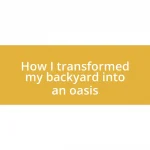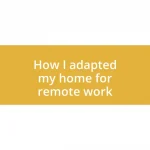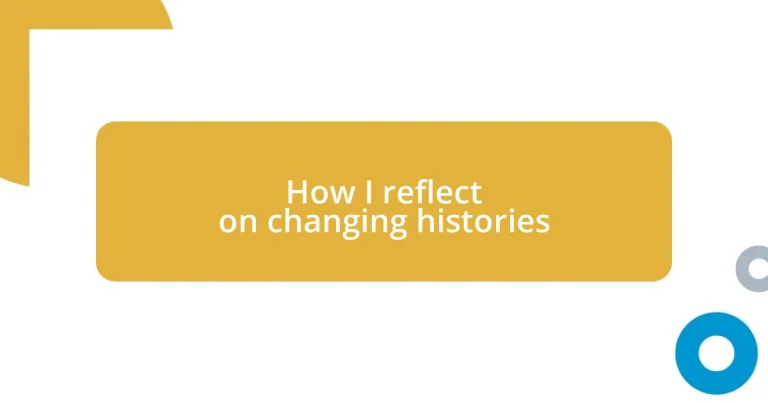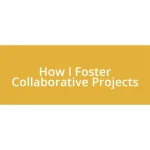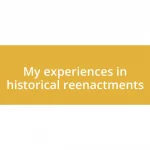Key takeaways:
- Understanding history is a fluid process influenced by culture, personal biases, and storytelling perspectives.
- Reflection is essential for connecting personal experiences to broader historical narratives, fostering empathy and deeper understanding.
- Contemporary perspectives, such as those amplified through art and social media, enrich historical analysis and challenge traditional views.
- Embedding reflective practices in education and leadership can promote empathy and more inclusive social dynamics in the future.
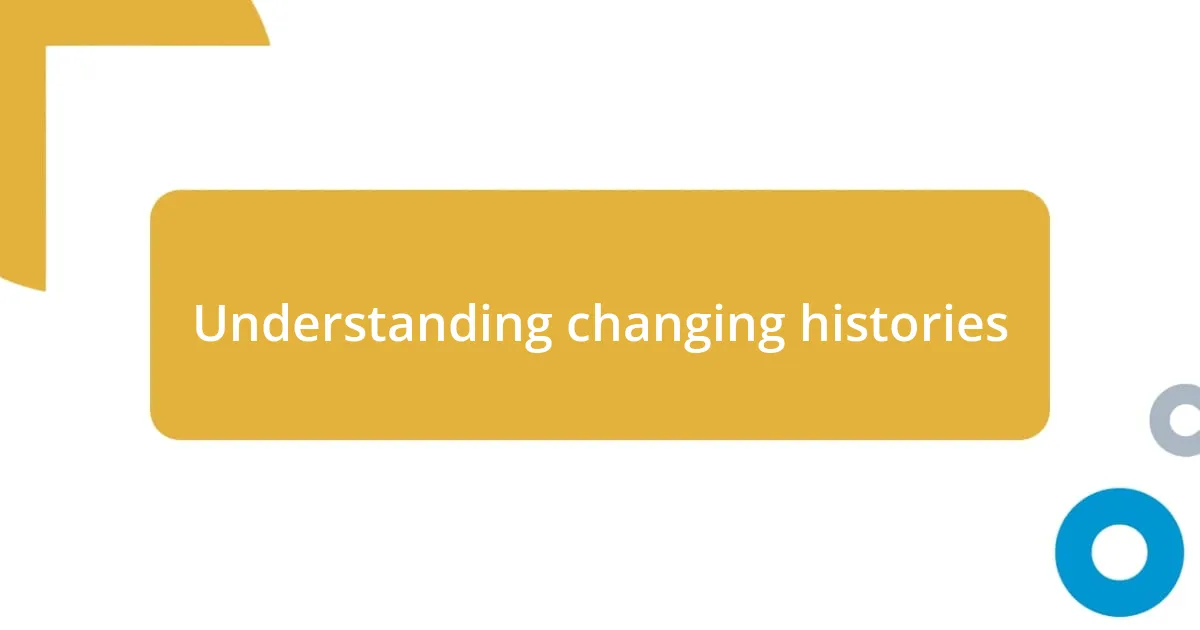
Understanding changing histories
Understanding changing histories can be a bit like peeling an onion; each layer reveals a new perspective. I often find myself reflecting on how my own family stories have shifted over time. Have you ever noticed how your parents’ accounts of their childhood change depending on the audience? This realization highlights the fluidity of history.
As I delve into the nuances of history, I feel a mix of intrigue and frustration. The more I learn, the more I see how narratives can be transformed by culture, politics, and even personal biases. An example that stands out for me is when I discovered that my hometown’s legend about its founding has developed significantly, shaped by local pride and selective memory. How can we truly know what happened when every storyteller brings their own lens to the narrative?
Reflecting on changing histories also stirs up emotions regarding identity. I remember sitting in a history class where discussions about colonial impacts struck a chord with me. It made me ponder how my understanding of my own background could reshape my perspectives. Isn’t it fascinating how the stories we tell ourselves about our pasts influence how we see the world today? Each insight invites me to embrace a more critical and empathetic view of history, one that recognizes its inherent complexities.
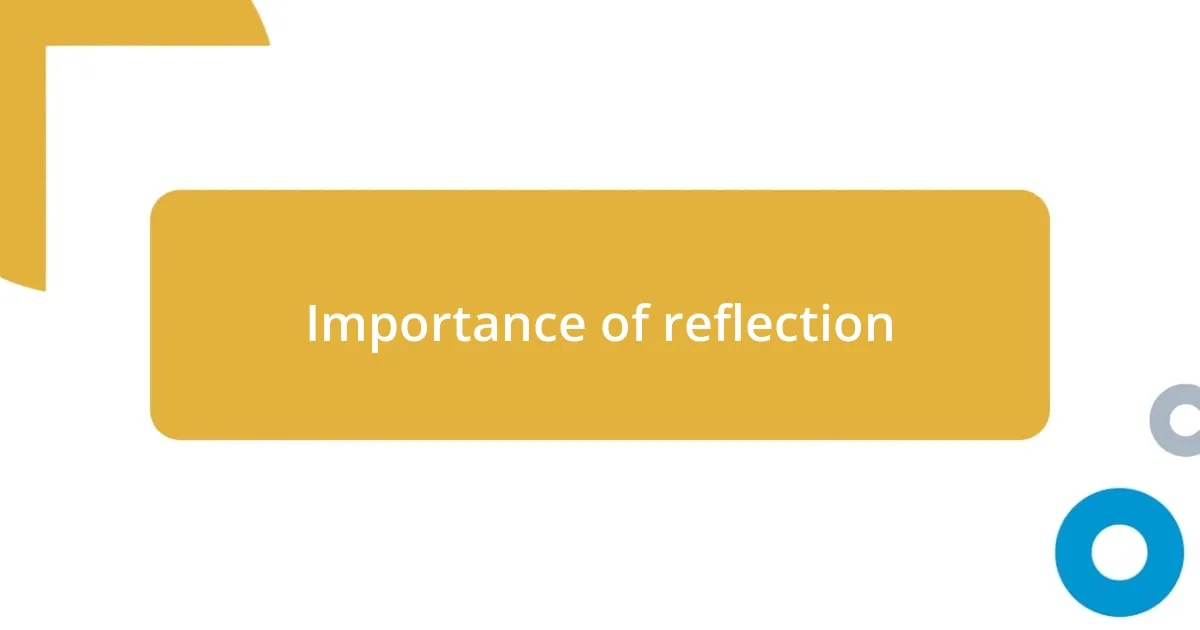
Importance of reflection
Reflection serves as a powerful tool in navigating the fluidity of history. I’ve found it essential to pause and consider how my memories intertwine with the larger narrative, especially when I think about discussions I’ve had with friends about their cultural backgrounds. It often shocks me to realize how much our personal histories can contradict or align with each other’s experiences, revealing the uniqueness yet interconnectedness of our stories.
Here are a few points that symbolize the importance of reflection on changing histories:
- It allows us to contextualize our experiences within broader historical narratives.
- Reflecting helps us recognize and challenge biases in our own perspectives.
- Engaging with differing viewpoints can foster empathy and understanding.
When I reflect, I also gain clarity on how my perceptions shift. I remember attending a family reunion where stories flowed back and forth, each retelling highlighting different aspects of our shared history. It was enlightening to witness how a significant event in our family’s past was seen through various lenses—not just mine but my cousins’ and even my grandparents’. This experience underscored the importance of reflection, as it reinforced the idea that history is never just a fixed account; it’s a living, breathing collection of perspectives that continually evolves.
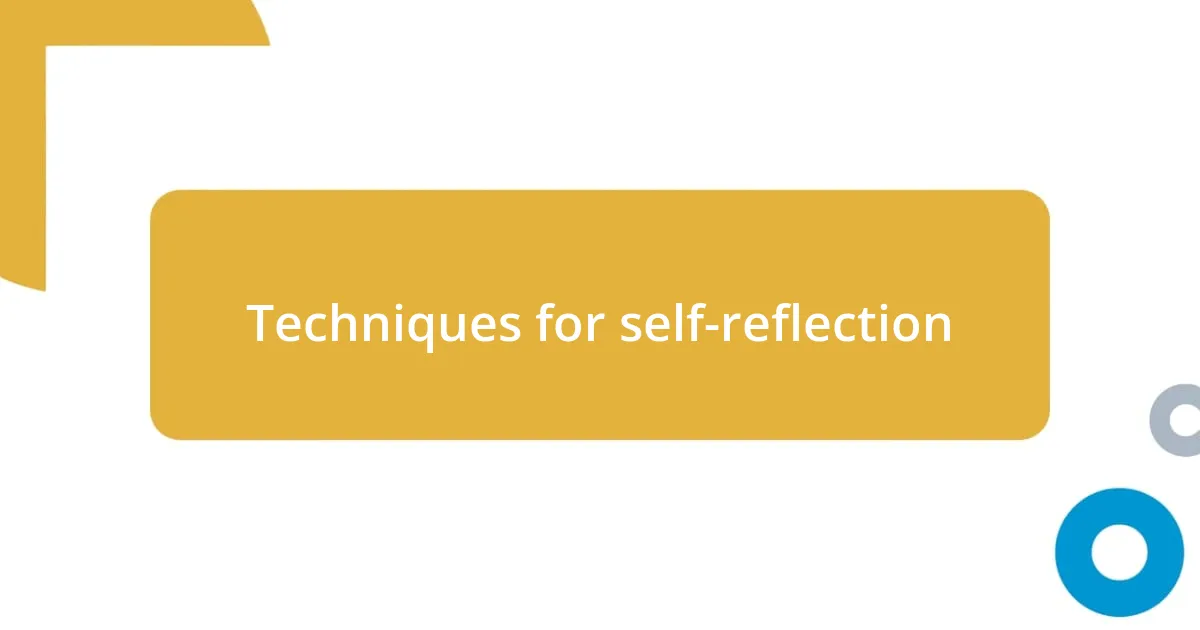
Techniques for self-reflection
Reflecting on my past has always been a fascinating journey. One technique I often employ is journaling. Writing down my thoughts helps me process experiences and emotions, making patterns emerge that I might not notice otherwise. There was a period when I struggled with my perception of past events, and putting pen to paper allowed me to see them from various angles. Have you ever tried capturing your thoughts this way? It can reveal aspects of your history you’d never considered—effectively turning your narrative into a dialogue with yourself.
Another method that has proven beneficial is mindfulness meditation. Engaging in mindfulness allows me to sit quietly and observe my thoughts without judgment. I remember a session where I reflected on the stories my family used to tell around the dinner table. As I breathed deeply, memories bubbled up, and I found myself questioning how my interpretation had been colored by emotions rather than facts. Isn’t it interesting how a quiet moment of contemplation can alter your understanding of your history?
Lastly, discussing narratives with trusted friends or family can provide fresh insights. I have a friend who often shares her perspective on collective memories, and it really makes me rethink my own experiences. Just last week, we chatted about a childhood event we both attended but remembered differently. Our conversation shed light on how our backgrounds and emotional responses shaped those memories. I’ve found that these discussions not only enrich my understanding but also deepen my connection to others as we weave together our various narratives.
| Technique | Description |
|---|---|
| Journaling | Writing down thoughts to uncover patterns and gain clarity. |
| Mindfulness Meditation | A practice allowing observation of thoughts without judgment, fostering deeper understanding. |
| Discussing with Others | Engaging in conversations about past events to gain new perspectives and insights. |
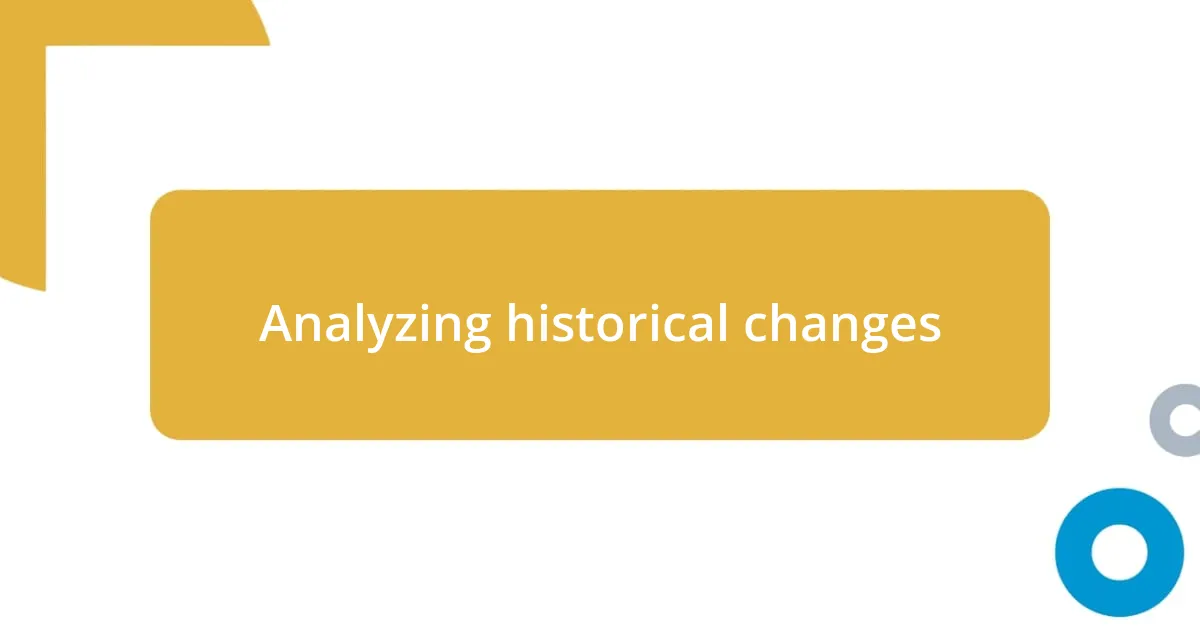
Analyzing historical changes
Analyzing historical changes requires a nuanced approach, recognizing how events ripple through time and influence collective memory. One instance that struck me was the way my understanding of a national holiday shifted over the years. Initially, I viewed it simply as a day off school, but after attending a community event celebrating its origins, I realized it signifies much more. Could understanding the roots of such events deepen our appreciation for cultural identities?
As I delve deeper into historical analysis, I often find myself grappling with the question of bias. For example, attending a panel discussion about local history opened my eyes to how narratives are constructed based on who is telling the story. I remember a speaker sharing a personal tale about a migration experience that challenged my preconceived notions about our town’s past. Isn’t it fascinating how a single perspective can unveil an entirely new layer of history?
Moreover, examining the shifts in societal attitudes is equally compelling. I recall reflecting on the evolution of attitudes towards mental health over the last few decades. It was enlightening to hear from someone who lived through that transformation, discussing the stigma they faced compared to the more open conversations we have today. This contrast highlighted how societal changes often depend on individual stories and shared experiences. What lessons can we draw from these transformations to inform our present and future?
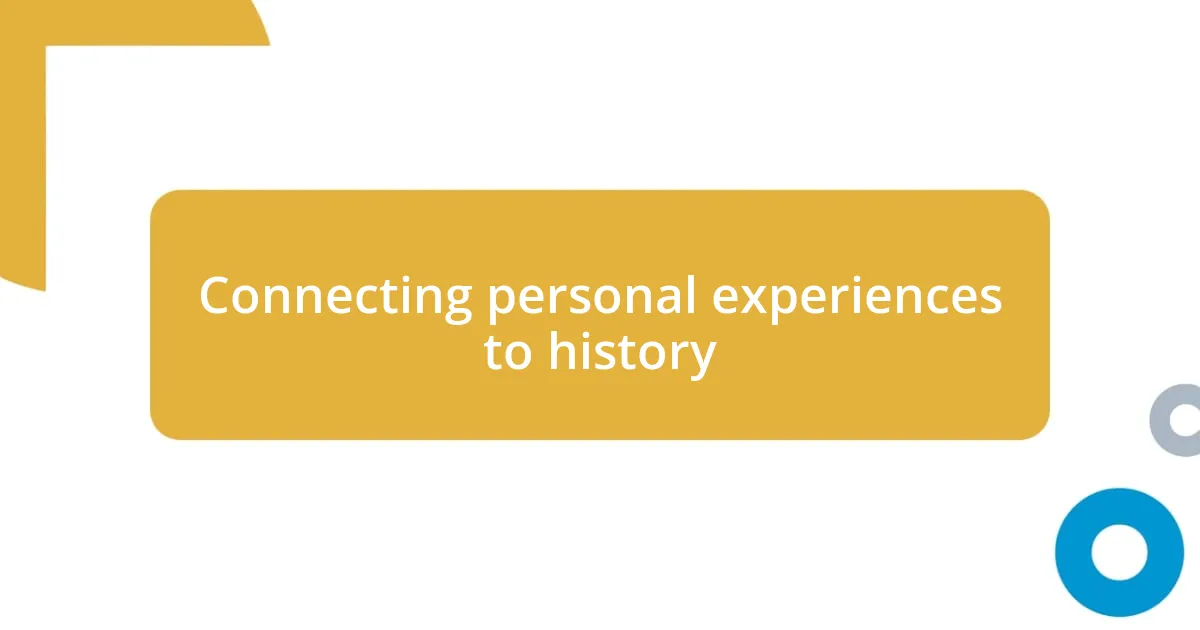
Connecting personal experiences to history
Connecting personal experiences to history often reveals the intricate layers that shape our understanding of the past. I remember when I first explored my family’s ancestry—digging through old photos and stories. Each discovery felt like unearthing a hidden treasure, allowing me to see how their experiences wove into the larger tapestry of history. This connection made me appreciate the broader context of events I once viewed as distant and unrelated.
Sometimes, reflecting on personal moments can serve as a powerful lens through which to understand historical events. I had a profound realization during a visit to a historical site related to a major social movement. Standing in the same location where significant conversations took place, I felt an emotional resonance. It made me question how my own life experiences reflected or contradicted the struggles embedded in that history. Have you ever felt history come alive in your own life? It’s a reminder that we are all interconnected; our stories are nuanced parts of a grander narrative.
Engaging with history on a personal level not only sheds light on events but also prompts introspection. I often think about how the choices my grandparents made during tough times echo in my own decisions today. Their resilience and courage inform my values and perspectives. Reflecting on those moments prompts me to ask: What legacies am I creating for future generations? Through this dialogue between my personal experiences and historical narratives, I find a deeper understanding of myself and the world around me.
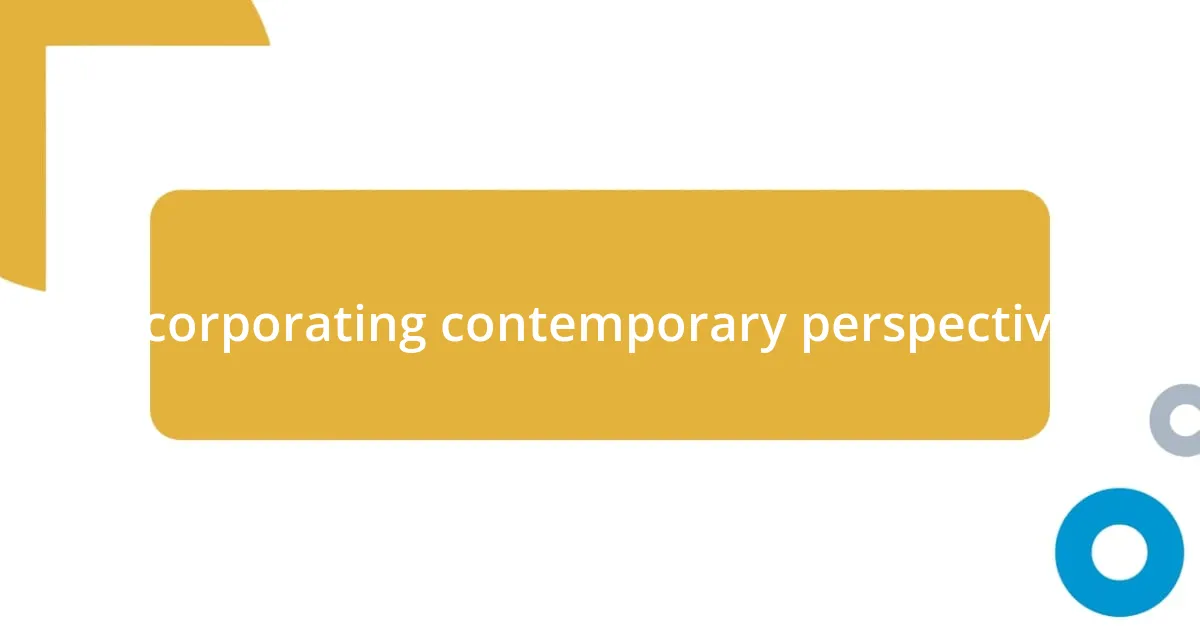
Incorporating contemporary perspectives
Incorporating contemporary perspectives into the study of history opens up a vibrant dialogue that challenges traditional narratives. I remember attending an art exhibit focused on modern interpretations of historical events. It struck me how artists expressed the complexities of race and identity through their work, urging viewers to reconsider what they thought they knew. Have you ever looked at a piece of art and felt a story behind it that changed your understanding? It’s a powerful reminder of how contemporary voices contribute to a richer comprehension of our past.
When I reflect on contemporary perspectives, I often think about social media’s role in shaping our views on history. I took part in an online discussion about a significant movement and heard firsthand accounts that weren’t in textbooks. Those voices—raw and real—opened my eyes to the experiences of people who lived through those changes. Isn’t it remarkable how platforms can amplify personal stories, ensuring that history isn’t just a collection of dates and events but also a mosaic of lives lived?
Furthermore, I find it essential to question how modern values might color our interpretations of historical events. I once joined a roundtable on the ethics of historical monuments, and our conversation took unexpected turns as we debated how these symbols reflect current societal values. Hearing different viewpoints made me reconsider which monuments deserved to stand and which should be reevaluated. How do today’s beliefs guide our understanding of yesterday’s actions? This ongoing reflection underscores the importance of recognizing contemporary perspectives in untangling the rich fabric of history.
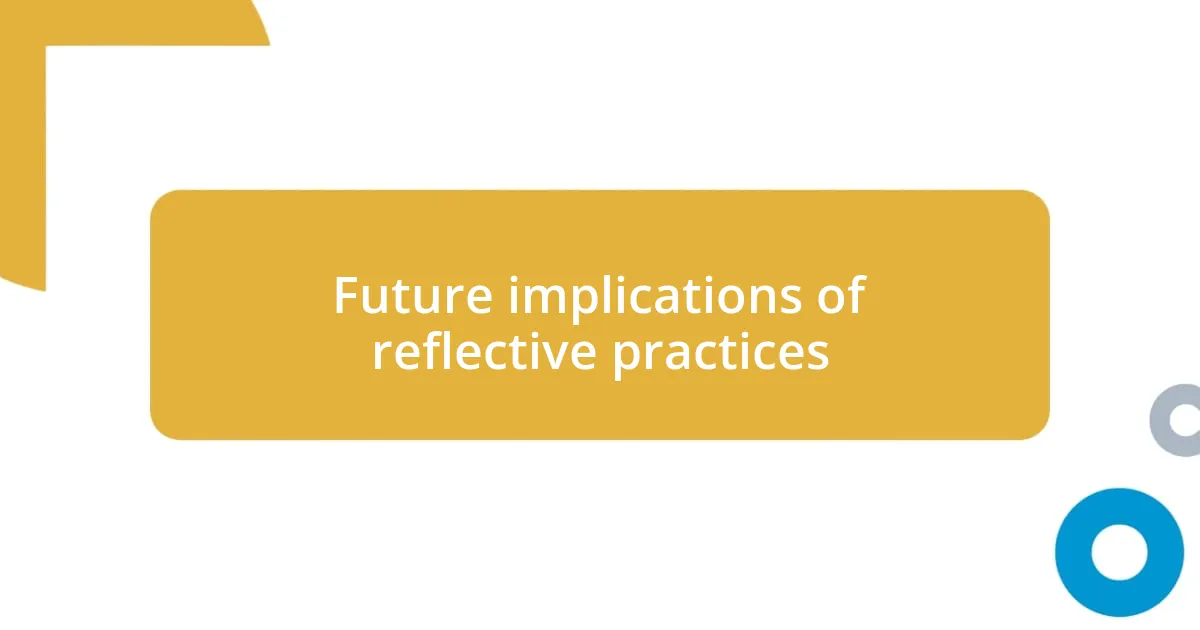
Future implications of reflective practices
Reflective practices hold tremendous potential for shaping our understanding of future social dynamics. I recall a conversation I had with a friend who teaches history. He emphasized that encouraging students to reflect on their personal connections to historical events can foster empathy and inclusivity. It made me wonder: how might future generations approach societal challenges armed with the lessons of empathy derived from reflection?
Moreover, as I engage in dialogues about historical injustices within my community, I’ve noticed a shift in perspectives towards activism. The more people share their reflections on past mistakes, the greater the collective resolve to champion change. I asked myself: if these reflective practices become ingrained in our culture, could we see a future where history serves as a roadmap for equity and justice instead of division?
Reflecting on history also plays a pivotal role in shaping leadership. I often think about how mindful leaders can use their understanding of past failures to navigate present complexities. During a workshop, a mentor mentioned that effective leaders are those who routinely reflect on their journey. It struck me: if we embed these reflective practices into our leadership development, wouldn’t we pave the way for more compassionate decision-making tomorrow?





